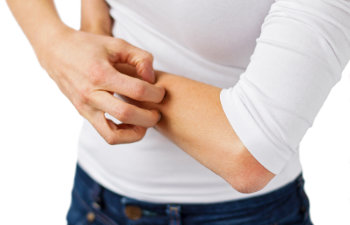
Fungi are all around us and it is normal to have fungi on your skin. Yeasts and different fungi are in the air and on surfaces, making it impossible not to come in contact with these organisms. Your body is designed to fight off fungal infections, keeping these organisms from invading your skin, but it is not always successful. There are many different types of skin fungal infections that can impact your health – here are some of the most notable and their symptoms.
Ringworm on the Body
Ringworm is a skin fungal infection that can affect various areas of the body. When this fungus affects the main areas on the torso or limbs, it is called tinea corporis. It is related to many different fungal skin infections that can impact the scalp, groin and feet. Symptoms of ringworm of the body include:
- Ring-shaped rash
- Round, raised edges around the rash
- Itchy skin
- Clear skin inside the ring rash
Ringworm can be contracted from humans or animals. It is very contagious and can spread from direct contact or from contact with fabrics or surfaces that contain the fungi.
Athlete’s Foot and Jock Itch
Athlete’s foot (tinea pedis) and jock itch (tinea cruris) are types of fungal infections that affect the feet and groin. The moist, warm areas between the toes or in the groin folds are enticing to fungi. Locker rooms in gyms, schools and community pools are often breeding grounds for these fungi, which can spread from person to person in showers and other areas. Symptoms can include:
- Itching and burning sensation between toes or in the groin area
- Red, scaly skin which can peel
- Rash in the groin area
- Cracked or blistered skin on the feet
The fungi that cause athlete’s foot and jock itch can spread to other areas. Toenails can become infected from athlete’s foot as well as other types of infections.
Ringworm of the Scalp
When the fungi that causes ringworm on the body, feet and groin areas affects the scalp, it is called tinea capitis. This type of skin fungal infection usually affects children, and it can be spread by sharing hair brushes and other head gear. Some of the symptoms include:
- Itchy, scaly scalp skin
- Red, bald patches
- Broken hair shafts
- Painful patches on the scalp
Severe cases of ringworm of the scalp can lead to permanent hair loss if the hair follicles are damaged.
Skin fungal infections are very common and can be very aggravating. If you have any symptoms of ringworm and the associated skin infections, contact our team at MJR Dermatology. We provide advanced treatments for fungal skin infections at our medical center in Lawrenceville, GA.
Posted on behalf of
2000 Riverside Pkwy, Suite 100
Lawrenceville, GA 30043
Located on the lower Courtyard Level
Phone: (678) 535-0067
Email: info@mjrderm.com